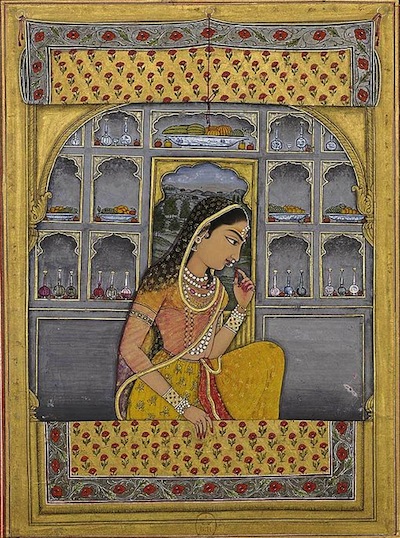How the Son of the King of Babylon fell in love with a young woman
The parrot replied, "My mistress, whatever you say is proper; tonight you must tell a tale to your lover and require of him an answer, which if he gives properly, you may account him wise, but if he returns an improper answer, rest assured he is deficient in understanding."
Rhojisteh asked, "What tale is it on which I am to question him?"
The parrot began:
Once on a time, the son of the king of Babylon, happening to enter an idol temple, there beheld a young woman, the brightness of whose countenance resembled the moon, as did her jetty locks the darkest night; her stature was as erect as the cypress, and her walk graceful as the pheasant.
He was instantly smitten with her charms and, laying his head at the feet of the principal idol in the temple, in a plaintive and feeble tone thus expressed himself, "If that young woman should marry me, I will sever my head from my body and sacrifice it to you."
In short, the king's son sent a message to the girl's father and asked her in marriage. Her father gave his consent, and the marriage was performed agreeably to the rites and ceremonies of their respective tribes. In short, the lovers were united.
After some days, the father invited his daughter and son-in-law to his own house. The king's son, with his wife, set out for the father-in-law's house, and a brahmin who had been the intimate companion of the king's son also accompanied them. When the prince approached the temple where he had first seen his wife, he recollected the vow he had made to the idol of the place. He went alone into the temple in order to perform his vow, and, cutting off his own head, dropped it at the feet of the image.
Afterwards, when the brahmin also entered the temple, he saw the prince lying dead and was terrified; he thought, "If I remain alone, people will suppose me to have been his murderer." When many such reflections had passed in his mind, he said, "It will be best for me to cut off my own head and leave it also at the feet of the idol."
Then the brahmin cut off his own head and dropped down at the feet of the image.
A minute after, the wife also came into the temple and, seeing both persons slain, was astonished, not being able to account for what had happened. She resolved to sever her own head from her body and to burn with her husband.
At that interval a voice issued from the temple, "O woman! Replace the severed heads on their respective trunks, when they will be alive again."
The woman was so overjoyed on hearing these words, that, in her hurry, she placed her husband's head on the brahmin's body and put the brahmin's head upon her husband's shoulders, and instantly they were both restored to life and stood before the woman. Then began a dispute between the prince's body and the brahmin's head, each claiming her for his wife.
When the parrot had related thus far of the story, he said to Khojisteh, "If you want to try his understanding, ask him which had a right to the wife: the husband's head, or the husband's body?"
Khojisteh requested the parrot to instruct her on this point.
The parrot replied, "The rightful owner of that woman is the husband's head, because the head is the seat of wisdom and presides over the body."
When Khojisteh had heard the end of the story, she stood up with intention to go to her lover; instantly the cock crowed and, dawn appearing, her departure was delayed.
Next: The Merchant's Daughter
(700 words)
